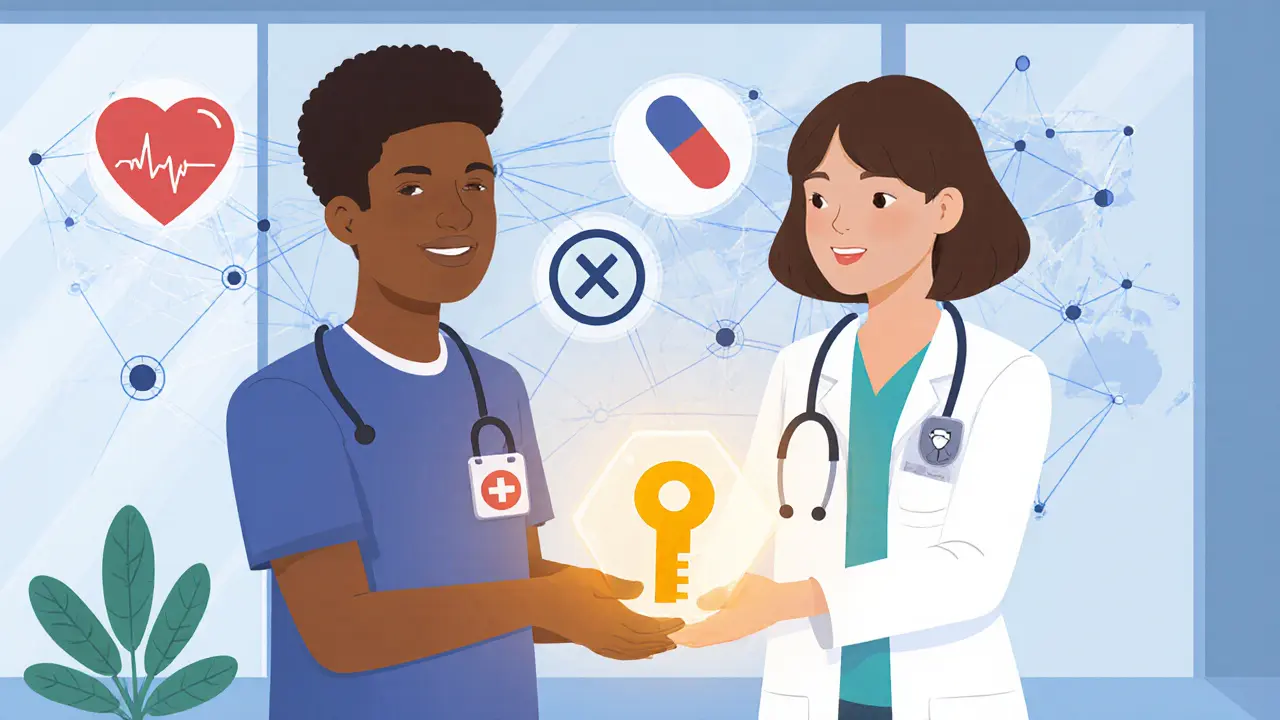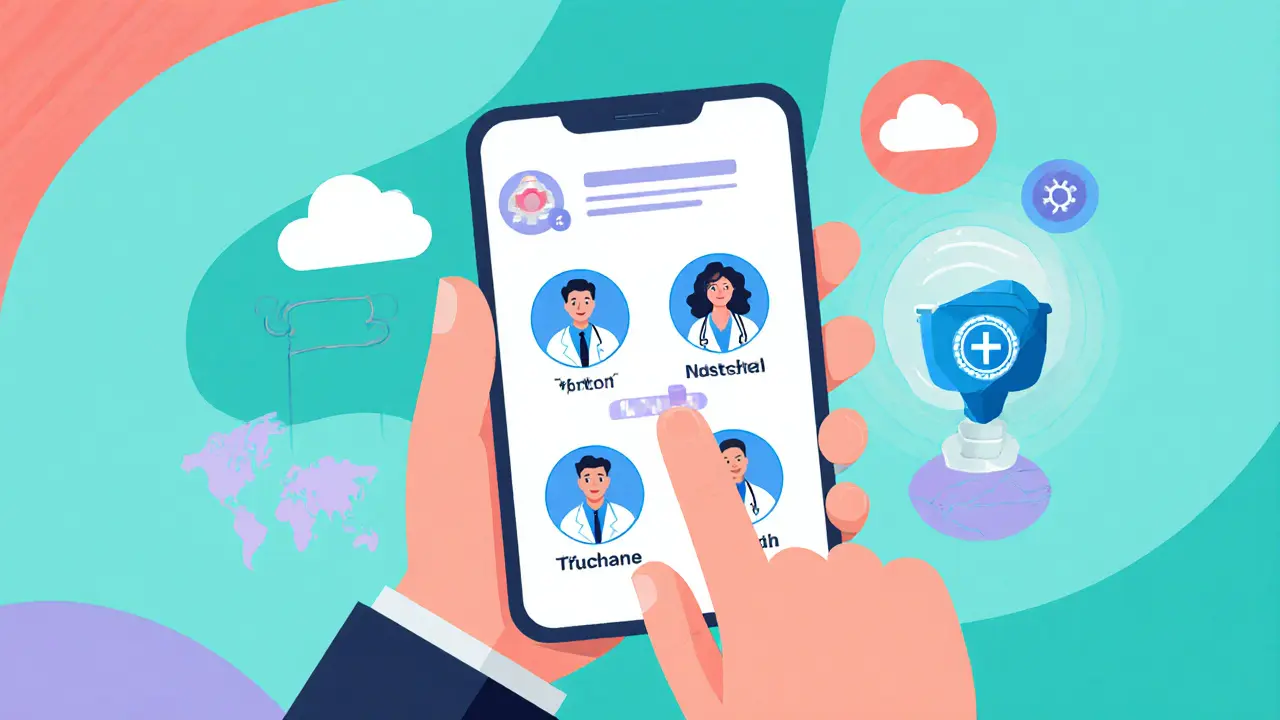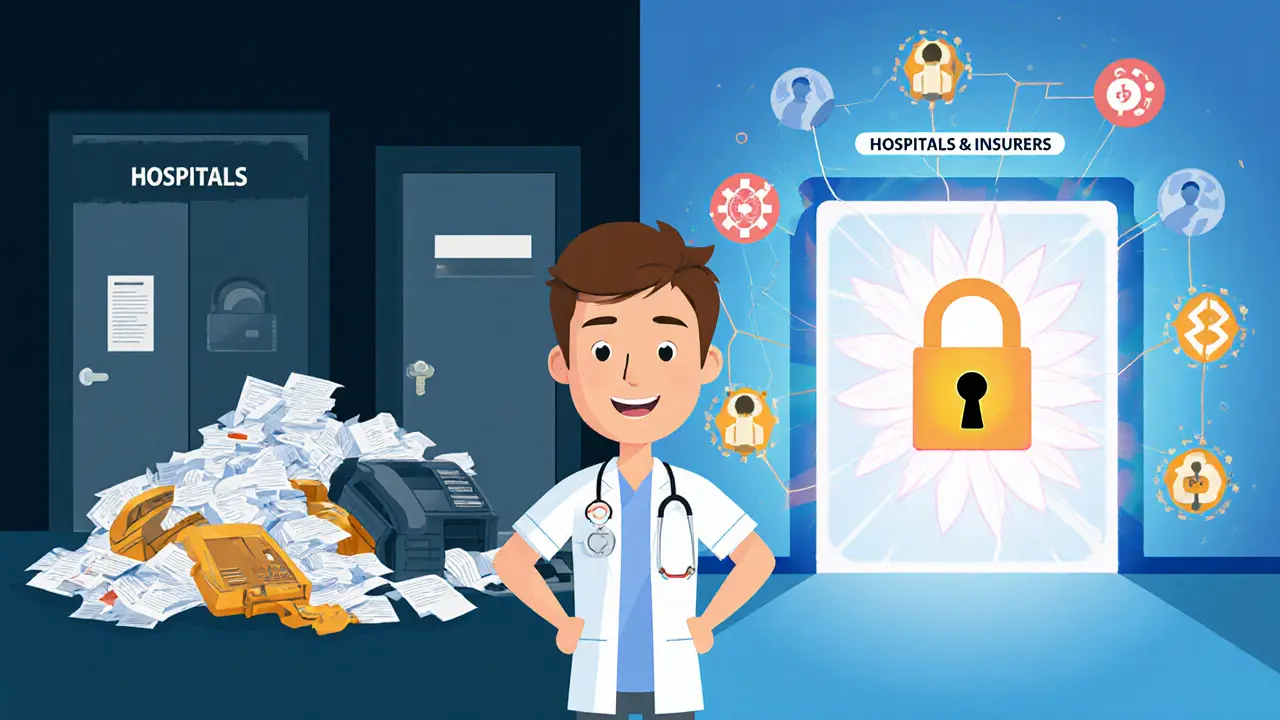Blockchain for Healthcare Data Management: Secure, Patient-Controlled Medical Records
 Apr, 6 2025
Apr, 6 2025
Medical Record Access Simulator
Your Medical Record Access Request
How Blockchain Protects Your Records
Blockchain Security Features
- Decentralized Storage: Your data isn't stored in one vulnerable location
- Tamper-Proof Logs: Every access is recorded as an unchangeable transaction
- End-to-End Encryption: Only you can decrypt your data with your private key
- Granular Permissions: You choose exactly what data to share and for how long
Access Request Results
Imagine walking into an emergency room in another country, injured and unable to speak. Doctors need your history-medications, allergies, past surgeries-but your records are stuck in a hospital system halfway across the world. What if you could hand them a digital key-secure, instant, and only yours-to unlock your full medical history? That’s not science fiction. It’s what blockchain for healthcare data management is building right now.
Why Your Medical Records Are Still Broken
Right now, most hospitals use centralized systems like Epic or Cerner to store patient data. These systems are fast and familiar, but they’re also fragile. One breach, one glitch, one misconfigured server, and millions of records can vanish or get stolen. In 2022 alone, over 41 million patient records were exposed in U.S. data breaches. That’s not just a number-it’s your aunt’s insulin dosage, your child’s allergy history, your mental health notes. Worse, records don’t talk to each other. Your primary care doctor can’t easily see what your cardiologist wrote. Your pharmacy doesn’t know what the ER prescribed. That’s why 40% of patient records contain errors-missed allergies, duplicate tests, conflicting meds. It’s not laziness. It’s broken infrastructure. And who controls all this? Not you. Hospitals, insurers, and tech vendors do. You can request a copy, but you can’t control who sees it, when, or why.How Blockchain Solves This
Blockchain isn’t just Bitcoin. It’s a digital ledger that copies itself across hundreds or thousands of computers. No single company owns it. No central server can crash it. Every change is locked in with cryptography and recorded forever. Here’s how it works for your medical data:- Your records stay encrypted on secure cloud servers (off-chain), not on the blockchain itself. That’s because MRI scans and X-rays are huge files-blockchain isn’t built for that.
- What goes on the blockchain? A unique digital fingerprint-called a hash-of your data. Think of it like a tamper-proof seal. If anyone changes your lab results, the hash changes. Everyone knows it’s been tampered with.
- Each time a doctor, pharmacist, or lab asks to see your records, they send a request. You get a notification. You approve it. That approval is recorded on the blockchain as an auditable transaction.
Real-World Examples Already Working
You might think this is all theory. It’s not. Medicalchain, a platform launched in 2018, lets patients store their health data and grant access to doctors, hospitals, labs, and insurers-all with permission. Each access request is logged on the blockchain. Patients can even download their records to their phones and share them while traveling. One user said: “Here’s my patient record. Take all the details you want.” That’s global, instant access-no bureaucracy. The U.S. Food and Drug Administration partnered with Booz Allen Hamilton in 2018 to pilot blockchain at four major hospitals. They used Ethereum to manage access and IPFS (a decentralized file system) to store large files. The result? Faster access, fewer duplicates, and zero data breaches during the trial. Even the World Economic Forum calls blockchain a “cost-effective option” for healthcare because it prevents breaches before they happen. Why pay millions to fix a breach when you can spend far less to stop it?
Blockchain vs. Traditional EHR Systems
Let’s cut through the hype. Blockchain isn’t perfect. But here’s how it stacks up against the systems we use today:| Feature | Traditional EHR (Epic, Cerner) | Blockchain-Based System |
|---|---|---|
| Data Storage | Centralized servers | Distributed across nodes |
| Single Point of Failure | Yes | No |
| Data Tampering | Possible, hard to trace | Impossible without detection |
| Patient Control | Limited or none | Full control via private keys |
| Interoperability | Difficult between systems | Standardized via FHIR and APIs |
| Speed for Large Files | Fast | Uses off-chain storage (IPFS, cloud) |
| Cost Over Time | High (breach fines, audits, integration) | Lower (prevents breaches, reduces duplication) |
How Patients Actually Use It
Picture this: You’re diagnosed with a rare condition. You want to share your records with specialists in Boston, Berlin, and Brisbane. With traditional systems, you’d email PDFs. They’re outdated by the time they arrive. You’d have to call each doctor to confirm they got the right version. With blockchain:- You open your health app.
- You tap “Share with Dr. Chen in Boston.”
- You set a time limit: 7 days.
- You allow access to lab results, but not mental health notes.
- Dr. Chen gets a notification. She clicks. The system verifies your permission. She sees your data.
- Every step is recorded. You can see who accessed it, when, and what they saw.

Challenges-And How They’re Being Fixed
Blockchain isn’t magic. It has limits. Problem 1: Immutability vs. CorrectionsWhat if your blood type is recorded wrong? You can’t delete it. That’s a problem under HIPAA and GDPR, which require data to be corrected or deleted. Solution: Smart contracts. These are self-executing rules coded into the blockchain. Instead of deleting the error, you add a new block that says: “Correction: Blood type was misreported. Correct value: A+.” The original stays for audit. The correction is visible. Everyone knows what changed and why. Problem 2: Scalability
Public blockchains like Bitcoin process 7 transactions per second. A hospital does thousands of records per hour. Solution: Hybrid systems. Only hashes and access logs go on-chain. The actual data lives off-chain in encrypted cloud storage. IPFS, Amazon S3, or private cloud networks handle the heavy lifting. The blockchain just verifies: “Yes, this is the real record.” Problem 3: Adoption
Doctors aren’t blockchain experts. Hospitals have legacy systems. Training takes 3-6 months. Solution: APIs. Modern blockchain platforms connect to existing EHRs using standard protocols like FHIR (Fast Healthcare Interoperability Resources). No need to replace everything. Just plug in.
What’s Next?
The future isn’t just about records. It’s about control. Soon, patients might earn tokens for sharing anonymized data with researchers. Want to help cure diabetes? You opt in. You get a small payment. Your data stays encrypted. No one sells it without your permission. Regulators are catching up. HIPAA and GDPR now recognize blockchain as a valid method for data security-if implemented right. The FDA and EU health agencies are funding pilot programs. Big insurers like UnitedHealthcare are testing blockchain for claims and prior authorization. By 2030, blockchain won’t be “the future of healthcare.” It’ll be the baseline. Just like email replaced fax machines.What You Can Do Today
You don’t need to wait for hospitals to catch up. Start small:- Ask your doctor if they use a patient portal that supports FHIR standards.
- Download your medical records. Keep them on your phone or encrypted cloud drive.
- Learn about platforms like Medicalchain or MedRec. Try them when they launch in your region.
- Ask your insurer: “Do you use blockchain to secure my data?” If they don’t know, push for it.
Can blockchain really make my medical records safer?
Yes-because it removes the central point of failure. Traditional systems store all records in one place. Hack one server, get millions of records. Blockchain spreads data across hundreds of computers. Even if one node is compromised, the rest stay secure. Each record is protected by cryptography, and every access is recorded. Tampering is nearly impossible without detection.
Do I need to understand blockchain to use it?
No. You’ll interact with it through a simple app-like your banking app. You’ll tap “Share with Dr. Smith,” set permissions, and hit confirm. Behind the scenes, blockchain handles the security. You don’t need to know how hashing or consensus works. Just like you don’t need to know how electricity works to turn on a light.
What happens if I lose my private key?
This is the biggest risk. Your private key is your password to your health data. If you lose it, you lose access. That’s why platforms offer secure recovery options: encrypted backups, multi-signature recovery (where trusted contacts help restore access), or hardware wallets. Never store your key on your phone alone. Use a dedicated device or encrypted cloud backup.
Is blockchain HIPAA-compliant?
Yes-if designed correctly. HIPAA doesn’t ban blockchain; it requires data to be encrypted, access to be logged, and patients to control sharing. Blockchain meets all these. Many platforms, like Medicalchain, are built with HIPAA and GDPR in mind. They use end-to-end encryption, audit trails, and patient consent workflows. Always verify the platform has official compliance certifications.
Will my insurance company use my data against me?
Not if you don’t let them. With blockchain, you control who sees what. You can grant access to your cardiologist but block your insurer from seeing your mental health records. Some platforms even let you charge a small fee for data access-giving you power, not just privacy. Insurance companies can’t access your data unless you explicitly allow it.
How is this different from Apple Health or Google Health?
Apple and Google store your data on their servers. They control access. You can’t easily share with providers outside their ecosystem. Blockchain puts you in control. Your data isn’t stored by Apple or Google-it’s stored by you, encrypted, and shared only when you say so. No tech giant owns it. No corporation can sell it. You’re the gatekeeper.
Blockchain for healthcare isn’t about replacing doctors or hospitals. It’s about giving you back control over your most personal information. It’s about fixing the leaks in a broken system. And it’s already happening-not in some distant future, but right now, in clinics and labs across the U.S. and Europe.
Your health data is your most valuable asset. It’s time you treated it that way.
Belle Bormann
November 22, 2025 AT 20:56blockchain for medical records sounds cool but i tried to use medrec last year and my phone crashed trying to load the app. just give me a usb drive with my records on it. i can keep it in my wallet. no internet needed.
Jennifer MacLeod
November 23, 2025 AT 11:02i live in rural texas and my last hospital visit took three weeks to get my old records from another state. if this actually works i might finally stop carrying a shoebox full of paper. no joke.
David Hardy
November 24, 2025 AT 15:26this is the future. seriously. imagine being in a car accident abroad and just tapping your phone to give docs your whole history. no more guessing what meds you’re on. 🙌
Lisa Hubbard
November 25, 2025 AT 07:22look, i get the hype. blockchain this, decentralized that. but let’s be real-most doctors still use fax machines. the idea that they’re going to suddenly switch to a system that requires patients to manage cryptographic keys? please. the average person can’t even remember their wifi password. this isn’t innovation. it’s a luxury for tech bros who think everyone else lives in a silicon valley bubble. and don’t even get me started on the energy cost of all those nodes. just fix the damn EHRs already.
Dave Sorrell
November 25, 2025 AT 15:45the off-chain storage model using IPFS is actually the smart approach. putting raw medical files on-chain would be a disaster. hashes for integrity, encrypted files elsewhere, and granular access control via smart contracts? that’s the right balance. i’ve reviewed several pilot systems, and the ones that nailed this hybrid design had near-zero breaches and high provider adoption. the real challenge isn’t tech-it’s training clinicians to trust it.
asher malik
November 26, 2025 AT 10:31what happens when the system works too well? if your data is immutable and traceable, who’s to say it won’t be used against you? insurance companies, employers, even future partners could dig into your history. sure, you control access… but what if the pressure to share becomes social? what if your job requires you to unlock your mental health logs? the idea of control feels nice until you realize control is just another form of surveillance with better branding.
Julissa Patino
November 28, 2025 AT 07:40blockchain healthcare? more like blockchain scam. we already have HIPAA. we already have encryption. why do we need another overhyped tech fad that only benefits venture capitalists? the real problem is hospitals refusing to share data-not because of tech but because they’re greedy. fix the business model, not the blockchain.
Daryl Chew
November 30, 2025 AT 05:46you think this is about medical records? no. this is a backdoor for the deep state to track every pill you take, every therapist you see, every time you cry. the government’s already using this tech to flag ‘high-risk’ patients. your private key? it’s not yours. it’s theirs. and when you lose it? they’ll just reissue you a new one… with a tracker.
Linda English
November 30, 2025 AT 16:50i appreciate the vision, but i worry about elderly patients, or those with cognitive impairments, or people who don’t speak english well-how do we make sure they’re not left behind? the idea of a private key is beautiful in theory, but if your grandma can’t understand what ‘hash’ means, and the app doesn’t have voice guidance or a simple button that says ‘share with my son,’ then we’ve built a system that excludes the very people who need it most. technology should serve humanity, not the other way around. let’s design for vulnerability, not just efficiency.
Jody Veitch
December 1, 2025 AT 05:33the fact that you’re even entertaining this as a viable solution is embarrassing. America has the most advanced healthcare system in the world. We don’t need blockchain to fix what’s broken-because what’s broken isn’t the tech, it’s the incompetence of foreign bureaucrats and the failure of liberal policy to fund proper infrastructure. This is a distraction. A distraction funded by foreign tech firms with no stake in American patient outcomes. Stick to what works: trained staff, secure servers, and common sense. Not crypto mumbo-jumbo.